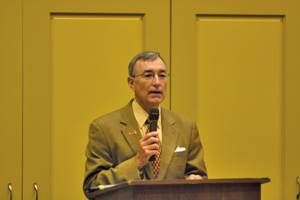Students show off their lending hands in Uganda

ISU President Geoffrey gives the opening speech before the film premiere of a documentary. The documentary depicts the Center for Sustainable Rural Livelihoods’ actions to help the people of Uganda become better farmers. Photo: Andrew Larson/ Iowa State Daily
October 1, 2008
Students and faculty were treated to an eye-opening evening that focused on the Ugandan experience as seen through the eyes of fellow students and faculty of Iowa State.
The documentary film, “Together — An African Success,” filmed by Mary and Ned Cordery centered around the efforts of Iowa State’s Center for Sustainable Rural Livelihoods and the work students and faculty have done there.
Organized in 2004, the Center for Sustainable Rural Livelihoods began working to improve living conditions in Uganda.
“The Center for Sustainable Rural Livelihoods facilitates opportunities for students and faculty in directly addressing issues facing the world,” said Wendy Wintersteen, dean of the College of Agriculture and Life Science Administration.
Students who travel to Uganda take part in the Service Learning Project, which tries to develop intellectual activities that benefit the community, said Lee Burras, associate professor of agronomy.
“The Service Learning Project focuses on educating school children, especially young girls — they are the best chance of improving food security [in Uganda],” said Burras.
Through this program, students are able to experience, first-hand, the problems the world is faced with.
“We are particularly pleased with the development of a student service learning program now in Uganda. It’s a great way to introduce Iowa State University students from disciplines across campus to the many challenges faced in the developing world,” said ISU President Gregory Geoffroy.
Along with the Service Learning Project, ISU students teach schoolchildren at the Namasagali School in Kamuli, Uganda.
Schoolchildren are taught about issues regarding nutrition. One area ISU students have focused on is instructing the Ugandan children how to raise poultry. From the chickens they raise, the children are provided with eggs — an important source of protein.
Also, students show Ugandan children how to grow gardens by creating school gardens. Children are able to take part in this hands-on experience, and then take what they learned home to their families and teach them how to grow a productive garden.
The college students then do a follow-up by making home visits to the families of the children to see how their gardens are prospering, as showcased through the documentary.
“As long as this program exists, we’ll be able to make a difference here,” said Clark Richardson, senior in agricultural business, who took part in this program.
“All of the students, who have not only been students, have been a vital part of the program in extending the work that we do in Uganda,” Geoffroy said.
Not only have students and faculty taken part in this life-changing program, but even Geoffroy has done his part.
“I did, personally, have the opportunity to travel to Uganda two years ago to see the program first hand. It was my first trip to Africa. And it was truly, it wasn’t just eye-opening, it was really transformational for me,” he said. “To really see the living conditions, the challenges, particularly the challenges that subsistence farmers face, but it was also wonderful to see the spirit of the people in Africa, and particularly in Uganda. And really to see the fantastic impact that this program is having. [Not only the impact] it’s having from individuals, but also from communities, and how the impact is spreading because of the particular design of the program.”
Geoffroy said he hopes to continue and possibly expand this program because of its success.
“The challenges that we face in addressing the problems in Uganda and the many developing countries are enormous, but we begin, as we always have, by helping one individual, in one family, in one community, and over time, that spreads as we continue to work hard and bring in more partners and do more. The impact of our work becomes larger and larger and then the challenges become less formidable and our goals more achievable,” Geoffroy said.
















